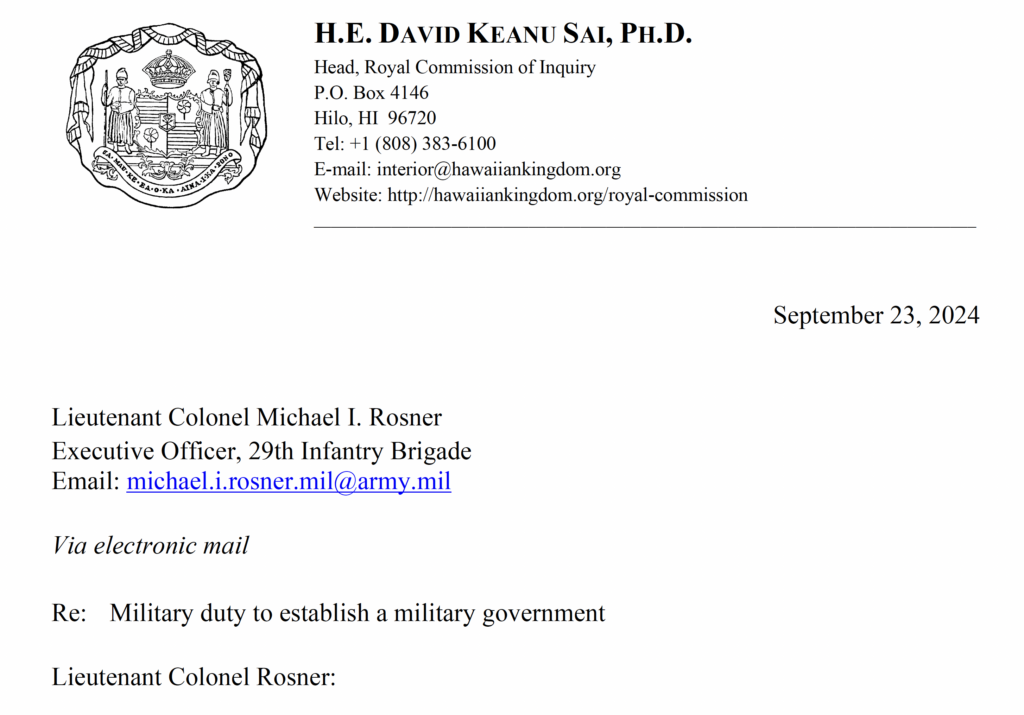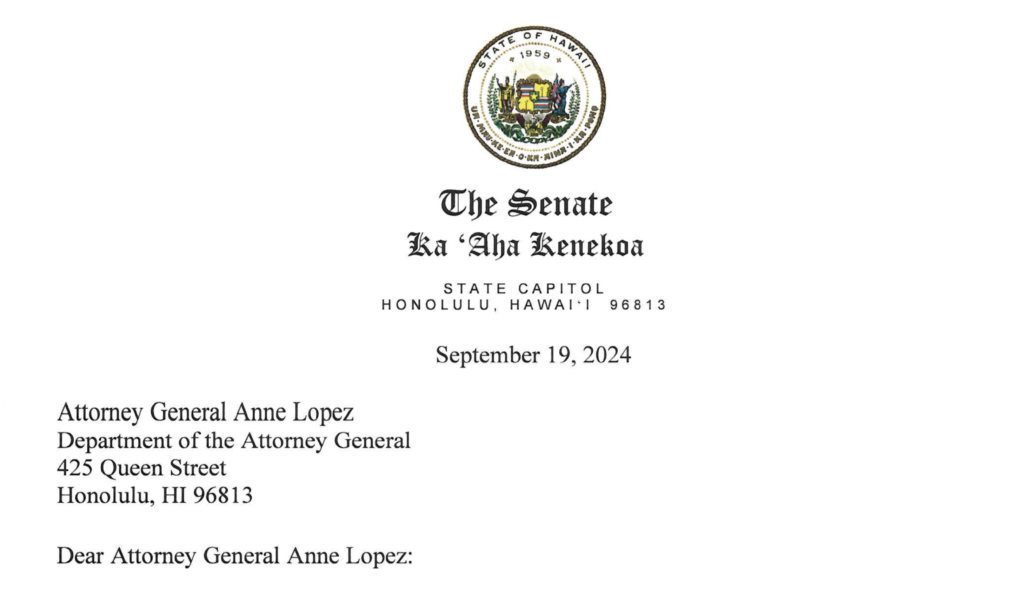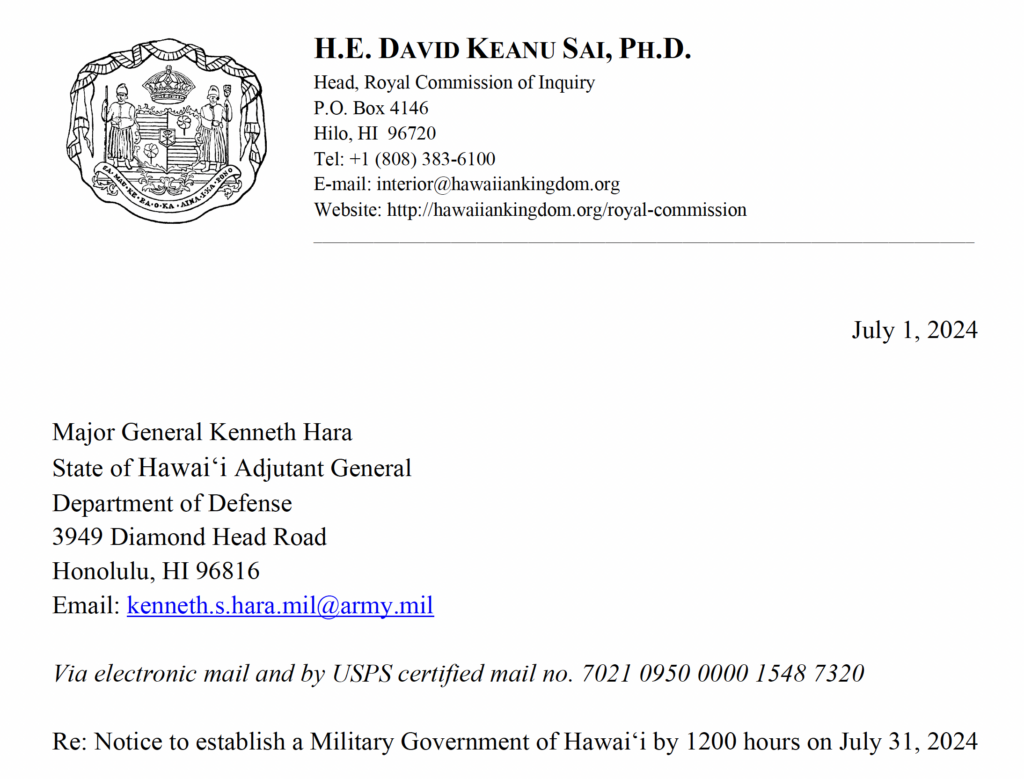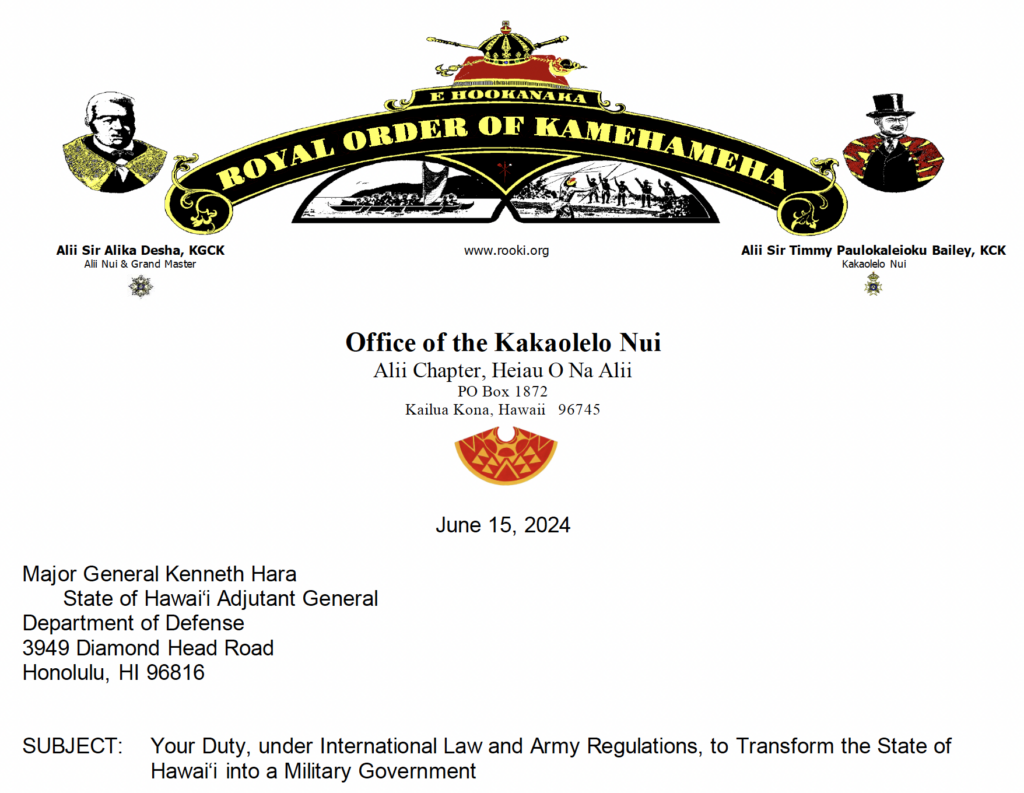Today, October 11, 2024, Dr. Keanu Sai, as Head of the Royal Commission of Inquiry, sent a letter to Lieutenant Colonel Michael Rosner regarding his military duty to transform the State of Hawai‘i into a Military Government in light of Senator Cross Makani Crabbe’s request for a legal opinion from Attorney General Anne Lopez. Here is a link to the letter.

In my letter to you dated September 23, 2024, I apprised you of Senator Cross Makani Crabbe’s formal request, under §28-3 Hawai‘i Revised Statutes, of Attorney General Anne Lopez for a legal opinion on this question:
Considering the two legal opinions by Professor Craven and Professor Lenzerini, that conclude the Hawaiian Kingdom continues to exist as a State under international law, which are enclosed with this request, is the State of Hawai‘i within the territory of the United States or is it within the territory of the Hawaiian Kingdom?
I also explained in that letter the presumption of continuity of a State, under customary international law, despite its government being overthrown by military force. Case in point was that the military overthrow of Saddam Hussein’s government in 2003, during the Second Gulf War, did not affect the continuity of the Iraqi State. Thereafter, United States forces established a military government by taking over the Iraqi civilian government, later to be called the Coalition Provisional Authority. Having been deployed to Iraq during the Second Gulf War you would know this.
When the Hawaiian Kingdom government was unlawfully overthrown by United States forces, the Hawaiian State continued to exist despite the failure of United States troops to establish a military government, to administer the laws of the occupied State, until a treaty of peace is established. Unlike Iraq, there is neither military government nor a treaty of peace that would have brought the American occupation of the Hawaiian Kingdom to an end. The illegality of the overthrow was acknowledged by President Grover Cleveland in his message to the United States Congress on December 18, 1893. In his message, President Cleveland concluded:
The lawful Government of Hawaii was overthrown without the drawing of a sword or the firing of a shot by a process every step of which, it may safely be asserted, is directly traceable to and dependent for its success upon the agency of the United States acting through its diplomatic and naval representatives.
But for the notorious predilections of the United States Minister for annexation, the Committee of Safety, which should be called the Committee of Annexation, would never have existed.
But for the landing of United States forces upon the false pretexts respecting the danger to life and property the committee would never have exposed themselves to the pains and penalties of treason by undertaking the subversion of the Queen’s Government.
But for the presence of the United States forces in the immediate vicinity and in position to afford all needed protection and support the committee would never have proclaimed the provisional government from the steps of the Government building.
And finally, but for the lawless occupation of Honolulu under false pretexts by the United States forces, and but for Minister Steven’s recognition of the provisional government when the United States forces were its sole support and constituted its only military strength, the Queen and her Government would never have yielded to the provisional government, even for a time and for the sole purpose of submitting her case to the enlightened justice of the United States.
The continuity of Hawaiian Statehood is a matter of customary international law and not the domestic laws of the United States. In 1999, the Permanent Court of Arbitration recognized that the Hawaiian Kingdom continued to exist as a State under customary international law. This provided the basis for the establishment of the arbitration tribunal on June 9, 2000. Furthermore, the continuity of Hawaiian Statehood under customary international law was explained in two legal opinions, one by Professor Matthew Craven and the other by Professor Federico Lenzerini. In addition, war crimes that are being committed, by the imposition of American municipal laws over the territory of the Hawaiian Kingdom, is also a matter of customary international law. This is explained by the legal opinion of Professor William Schabas.
Article 38 of the Statute of the International Court of Justice identifies five sources of international law: (a) treaties between States; (b) customary international law derived from the practice of States; (c) general principles of law recognized by civilized nations; and, as subsidiary means for the determination of rules of international law; (d) judicial decisions; and (e) the writings of “the most highly qualified publicists.” These writings by these academics are from “the most highly qualified publicists,” and are, therefore, a source of customary international law.
According to Professor Shaw, “[b]ecause of the lack of supreme authorities and institutions in the international legal order, the responsibility is all the greater upon publicists of the various nations to inject an element of coherence and order into the subject as well as to question the direction and purposes of the rules.” Thus, “academic writings are regarded as law-determining agencies, dealing with the verification of alleged rules.” As the U.S. Supreme Court explained in the Paquette Habana case:
International law is part of our law, and must be ascertained and administered by the courts of justice of appropriate jurisdiction, as often as questions of right depending upon it are duly presented for their determination. For this purpose, where there is no treaty, and no controlling executive or legislative act or judicial decision, resort must be had to the customs and usages of civilized nations; and, as evidence of these, to the works of jurists and commentators, who by years of labor, research and experience, have made themselves peculiarly well acquainted with the subjects of which they treat. Such works are resorted to by judicial tribunals, not for the speculations of their authors concerning what the law ought to be, but for trustworthy evidence of what the law really is (emphasis added).
As a source of international law, the legal opinions establish a shift in the burden of proof. The presumption of State continuity shifts the burden of proof as to what is to be proven and by whom to rebut this presumption. Like the presumption of innocence, the accused does not prove their innocence, but rather the prosecution must prove, beyond a reasonable doubt, that person’s guilt. Likewise, the Hawaiian Kingdom need not prove its continued existence, but rather, the Attorney General must prove, beyond a reasonable doubt, that the Hawaiian Kingdom had been extinguished as a State under international law. Such proof would make the State of Hawai‘i legitimate.
In other words, the Attorney General need not prove the State of Hawai‘i lawfully exists, but rather, it must prove, beyond any reasonable doubt, that the Hawaiian Kingdom does not exists, as a State, under the rules of international law as evidenced by the legal opinions of Professor Craven and Professor Lenzerini. Evidence of a valid demonstration of legal title, or sovereignty, by the United States would be an international treaty, particularly a peace treaty, whereby the Hawaiian Kingdom would have ceded its territory and sovereignty to the United States. Examples of foreign States ceding sovereign territory to the United States, by a peace treaty, include the 1848 Treaty of Peace, Friendship, Limits, and Settlement with the Republic of Mexico and the 1898 Treaty of Peace between the United States of America and the Kingdom of Spain.
In this case, there is no such treaty. There only exists a congressional joint resolution of annexation, purporting to have annexed a foreign State in 1898. This is an American municipal law limited in its effect to the territory of the United States. As the Department of Justice’s Office of Legal Counsel (“OLC”), concluded in its 1988 legal opinion, “[i]t is unclear which constitutional power Congress exercised when it acquired Hawaii by joint resolution,” and “[t]here is a serious question whether Congress has the authority either to assert jurisdiction over an expanded territorial sea for purposes of international law or to assert the United States’s sovereignty over it,” because only the President “has the authority to assert the United States’s sovereignty over the extended territorial sea.” This legal opinion also stated that “[o]nly by means of treaties […] can the relations between States be governed, for a legislative act is necessarily without extraterritorial force—confined in its operation to the territory of the State by whose legislature it is enacted.”
Absent the evidence of a treaty, the Hawaiian Kingdom continues to exist, as an occupied State with its sovereignty intact, despite the prolonged nature of the American occupation. Therefore, to restate paragraph 358, U.S. Army Field Manual 27-10, “military occupation confers upon the invading force the means of exercising control for the period of occupation. It does not transfer the sovereignty to the occupant, but simply the authority or power to exercise some of the rights of sovereignty (emphasis added).”
Do not wait for the Attorney General to provide Senator Crabbe with a legal opinion because, under customary international law, there is the presumption that the Hawaiian Kingdom, as a State, continues to exist. Moreover, the Attorney General does not have the same legal status as Professor Craven, Professor Lenzerini or Professor Schabas, under international law, because she is not a source of international law. Her only offer of proof, that the State of Hawai‘i is lawful, is to provide a treaty of cession where the Hawaiian Kingdom ceded its territory and sovereignty to the United States.
Senator Crabbe’s letter begins with the presumption that the State of Hawai‘i is within the territory of the Hawaiian Kingdom. Unless the Attorney General can provide rebuttable evidence, in her legal opinion, that the State of Hawai‘i is within the territory of the United States, then Senator Crabbe’s presumption remains as a matter of customary international law. The military duty to establish a military government is obligatory because the State of Hawai‘i is not within territorial boundaries of the United States.
More importantly, LTC Phelps was unable to refute the information and evidence I provided MG Hara at our meeting at the Grand Naniloa Hotel on April 13, 2023. Then MG Hara acknowledged to a mutual friend, on July 27, 2023, that the Hawaiian Kingdom is an occupied State. Subsequently, Attorney General Lopez interfered with MG Hara’s military duty by instructing him to ignore me.
From a legal standpoint, the Attorney General has been silenced by Senator Crabbe’s letter. Consequently, since MG Hara failed, as the Head of the Department of Defense to perform, as Senator Crabbe did, which resulted in the failure to transform the State of Hawai‘i into a military government, then MG Hara, Brigadier General Stephen Logan, Colonel Wesley Kawakami, Lieutenant Colonel Fredrick Werner, Bingham Tuisamatatele, Jr., Lieutenant Colonel Joshua Jacobs, and Lieutenant Colonel Dale Balsis, have all been made the subject of war criminal reports for the war crime by omission. As a result, you are, now, the most senior officer in the Army National Guard.
I strongly urge you to reach out to Lieutenant Colonel Phelps, as the Staff Judge Advocate, on this matter of transforming the State of Hawai‘i into a military government, by developing an Operations Order from the Hawaiian Council of Regency’s Operational Plan for Transitioning the State of Hawai‘i into a Military Government. The Council of Regency is prepared to meet with you on this matter because, as Professor Lenzerini explains in his legal opinion, “the working relationship between the Regency and the administration of the occupying State,” is paramount. I am enclosing my curriculum vitae.



